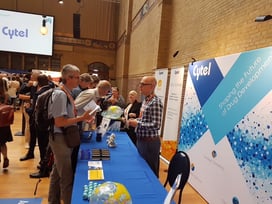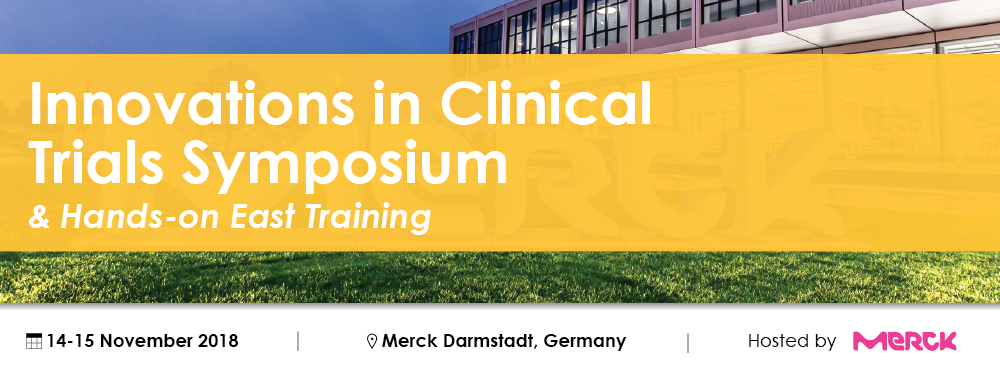Highlights from the PSI 2018 Conference

A number of the Cytel team were in Amsterdam, 3rd- 6th June 2018 for the PSI Conference. This year’s conference was held at the magnificent Beurs Van Berlage, a venue full of history and interesting architectural features. We took the opportunity to give delegates a first look at OK GO, our new clinical trial Go/No-Go decision-making software in this magnificent setting.
In this blog, we'll summarize some of the particular highlights from the sessions that our team members attended.

Causal Inference: Estimating the treatment effect in a subgroup defined by an early post-baseline biomarker measurement in randomized clinical trials. Presenter: Björn Bornkamp - Novartis
Amitava Mukhopadhyay, Associate Director, Biostatistics from India was particularly interested in this talk. During the session, different methods of estimating the treatment effect based post-baseline biomarker measurements were presented. Björn then focused on the treatment effect for the population of patients that would be threshold achievers if assigned to treatment and the biomarker assessment at post baseline and subgroup of interest for the overall trial population; finishing with identification of estimands and required assumptions in a parallel group trial.
Key take away
Björn's comment that “Causal inference provides a useful tool set for the pharmaceutical statistician” resonated with Amitava. He is now investigating how causal inference can provide a meaningful approach in a challenging situation, and is considering the draft ICH E9 addendum regarding causal inference.
 Bayesian Analysis Methods: A Bayesian model to estimate the cut off and the clinical utility of a biomarker assay. Presenter: Eleni Vradi - PhD candidate at Bayer AG
Bayesian Analysis Methods: A Bayesian model to estimate the cut off and the clinical utility of a biomarker assay. Presenter: Eleni Vradi - PhD candidate at Bayer AG
This session was a highlight for Andrea Hita, a Data Scientist from our Barcelona office. Here at Cytel we have been using adaptive designs for population enrichment trials that allow uncertainty on the cut-off value during the first interim.
In this presentation, a Bayesian method to estimate the cut-off value using the negative and positive predictive values was proposed. Bayesian inference allows us to incorporate prior information, and obtain posterior estimates and credible intervals for the cut-off.
Key take away
Andrea believes it is very useful to use a model to estimate the cut-off value on biomarker studies. It allows you to not only estimate the value, but also accurately characterize the uncertainty around these cut-off values when dealing with biomarkers’ predictive performance by taking advantage of historical data.
Dose: The Most Important Question? Presenters: Sandeep Menon - Pfizer, Jane Temple - GSK, Simona Rossomanno - F. Hoffmann – La Roche
Reetabrata Bhattacharyya, Senior Biostatistician and Ankur Mukherjee, Software Affiliate at Cytel found this session very thought-provoking. Indeed, Cytel’ EAST ESCALATE module handles dose response modelling.
The session incorporated three interconnected presentations. The presenters discussed dose finding designs, the challenges, how to use the MCP-Mod method for dose finding in clinical trials, the regulatory angles and importantly the way forward.
Key take aways
Model-based approaches have become increasingly important within dose response studies in clinical trials. However, there is a lack of specific means to select the priors for the Bayesian methodology.
It was also useful to explore in more detail the application of the MCP-Mod method for dose findings in early phase clinical trials.
Estimands Case Studies: Presenter: Colin Neate - Roche

Estimands is probably the hottest topic this year and urgent in the context of emerging new regulatory guidance. Benjamin Esterni, Associate Director, Biostatistics at Cytel found this session critical, as we will need to present analyses through the estimands framework.
Key take away
Colin shared recommendations for statisticians on good practice when defining estimands for time-to-event endpoints during trial design. In the future, we can expect that protocols will use the estimands framework, and even if this is not implemented at the protocol level, it will be required at the SAP Statistical Analysis Plan (SAP) level.
 I predict a Bayesian. Presenters: Fiona Guillard – GSK, Gaelle Saint-Hilary - University of Turin, Ros Walley – UCB
I predict a Bayesian. Presenters: Fiona Guillard – GSK, Gaelle Saint-Hilary - University of Turin, Ros Walley – UCB
For Ursula Garczarek, Director of Strategic Consulting at Cytel this session was a particular highlight as it is an area she has personally worked in and presented on extensively.
The session showed that Bayesian approaches have now – after a phase of rather theoretical advertisement – been put into practice in drug development: For decision making (Gaelle Saint-Hilary), for study designs with fewer patients/arms with informative priors from historical data (Fiona Guillard), and just generally for providing evidence of drug performance (Ros Walley).
Key take aways
When publishing a Bayesian study, the key to success could be having the design published beforehand in statistical journals for transparency because it will gain trust, as well as allows enough room to be absolutely precise. Currently, this is impossible due to the space allowed for the “statistical methods” section in medical journals.
The “Predictive Probability of Success using Surrogate Endpoints” section of the presentation had a strong message. A key consideration is that mixture priors with a weighted sum from an informative and minimally informative prior is the most commonly applied strategy in practice for robustification.
Aditional highlights
 Other important themes of the conference included individualized treatment, patientcentricity, statistics and data science. Cytel delivered two data science workshops:
Other important themes of the conference included individualized treatment, patientcentricity, statistics and data science. Cytel delivered two data science workshops:
1) Analysis of high dimensional data (big data) in clinical trials.
2) Applications of data science in pharmacovigilance and post-marketing data
In an upcoming blog, we will share a summary from the sessions.
Paul Terrill, Director, Strategic Consulting at Cytel and Board Member of the PSI commented “The annual PSI conference is growing in size and stature ever year. This year’s conference was the biggest yet and was another excellent success. The sessions covered a large variety of topics and were delivered in an interesting and diverse range of styles. There was also a very well attended exhibitor area, including representatives from both pharmaceutical companies and service providers. I am very pleased and proud that Cytel was a platinum sponsor of the conference”.

Don't Miss Cytel's 2018 East® User Group Meeting
The East User Group Meeting (EUGM) will take place on the 14 & 15 November 2018 at Merck in Darmstadt, Germany. Join industry experts, thought leaders and applied statisticians to discuss the future of clinical trials. Early bird registration is now open and you can view the agenda www.cytel.com/eugmreg
Day 1: Innovations in Clinical Trials Symposium
Hear from leading design and implementation innovators, keynote speakers include Stephen Senn, Meinhard Kieser, Robert Greene and Simon Kirby.
Day 2: Hands-on East Training
East is the industry standard for designing adequate and well-controlled clinical trials as per FDA and EMA guidance. For over 20 years, East has reliably and continuously enabled drug and medical device trial sponsors of all sizes to optimize their trial planning and monitoring efforts.
Come and learn about existing and new developments during our hands-on East software training sessions.
For the full agenda or to reserve your space please click below:


